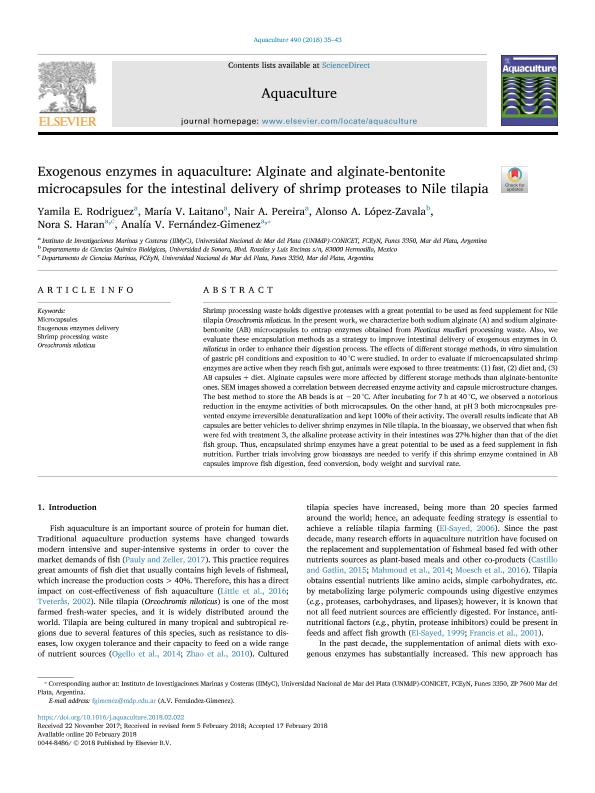Artículo
Exogenous enzymes in aquaculture: Alginate and alginate-bentonite microcapsules for the intestinal delivery of shrimp proteases to Nile tilapia
Rodriguez, Yamila Eliana ; Laitano, Marìa Victoria
; Laitano, Marìa Victoria ; Pereira, Nair de Los Angeles
; Pereira, Nair de Los Angeles ; López Zavala, Alonso A.; Haran, Nora Selma; Fernandez Gimenez, Analia Veronica
; López Zavala, Alonso A.; Haran, Nora Selma; Fernandez Gimenez, Analia Veronica
 ; Laitano, Marìa Victoria
; Laitano, Marìa Victoria ; Pereira, Nair de Los Angeles
; Pereira, Nair de Los Angeles ; López Zavala, Alonso A.; Haran, Nora Selma; Fernandez Gimenez, Analia Veronica
; López Zavala, Alonso A.; Haran, Nora Selma; Fernandez Gimenez, Analia Veronica
Fecha de publicación:
20/01/2018
Editorial:
Elsevier Science
Revista:
Aquaculture
ISSN:
0044-8486
Idioma:
Inglés
Tipo de recurso:
Artículo publicado
Clasificación temática:
Resumen
Shrimp processing waste holds digestive proteases with a great potential to be used as feed supplement for Nile tilapia Oreochromis niloticus. In the present work, we characterize both sodium alginate (A) and sodium alginate-bentonite (AB) microcapsules to entrap enzymes obtained from Pleoticus muelleri processing waste. Also, we evaluate these encapsulation methods as a strategy to improve intestinal delivery of exogenous enzymes in O. niloticus in order to enhance their digestion process. The effects of different storage methods, in vitro simulation of gastric pH conditions and exposition to 40 °C were studied. In order to evaluate if microencapsulated shrimp enzymes are active when they reach fish gut, animals were exposed to three treatments: (1) fast, (2) diet and, (3) AB capsules + diet. Alginate capsules were more affected by different storage methods than alginate-bentonite ones. SEM images showed a correlation between decreased enzyme activity and capsule microstructure changes. The best method to store the AB beads is at −20 °C. After incubating for 7 h at 40 °C, we observed a notorious reduction in the enzyme activities of both microcapsules. On the other hand, at pH 3 both microcapsules prevented enzyme irreversible denaturalization and kept 100% of their activity. The overall results indicate that AB capsules are better vehicles to deliver shrimp enzymes in Nile tilapia. In the bioassay, we observed that when fish were fed with treatment 3, the alkaline protease activity in their intestines was 27% higher than that of the diet fish group. Thus, encapsulated shrimp enzymes have a great potential to be used as a feed supplement in fish nutrition. Further trials involving grow bioassays are needed to verify if this shrimp enzyme contained in AB capsules improve fish digestion, feed conversion, body weight and survival rate.
Archivos asociados
Licencia
Identificadores
Colecciones
Articulos(IIMYC)
Articulos de INSTITUTO DE INVESTIGACIONES MARINAS Y COSTERAS
Articulos de INSTITUTO DE INVESTIGACIONES MARINAS Y COSTERAS
Citación
Rodriguez, Yamila Eliana; Laitano, Marìa Victoria; Pereira, Nair de Los Angeles; López Zavala, Alonso A.; Haran, Nora Selma; et al.; Exogenous enzymes in aquaculture: Alginate and alginate-bentonite microcapsules for the intestinal delivery of shrimp proteases to Nile tilapia; Elsevier Science; Aquaculture; 490; 20-1-2018; 35-43
Compartir
Altmétricas



